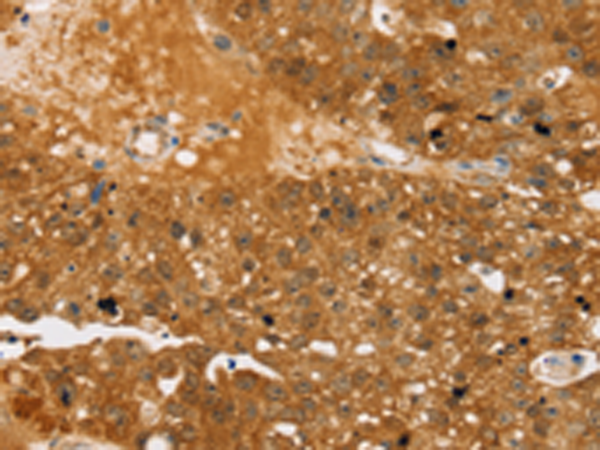

| WB | 咨询技术 | Human,Mouse,Rat |
| IF | 咨询技术 | Human,Mouse,Rat |
| IHC | 1/30-1/150 | Human,Mouse,Rat |
| ICC | 技术咨询 | Human,Mouse,Rat |
| FCM | 咨询技术 | Human,Mouse,Rat |
| Elisa | 1/2000-1/5000 | Human,Mouse,Rat |
| Aliases | AS160 |
| WB Predicted band size | 147 kDa |
| Host/Isotype | Rabbit IgG |
| Antibody Type | Primary antibody |
| Storage | Store at 4°C short term. Aliquot and store at -20°C long term. Avoid freeze/thaw cycles. |
| Species Reactivity | Human, Mouse |
| Immunogen | Synthetic peptide of human TBC1D4 |
| Formulation | Purified antibody in PBS with 0.05% sodium azide and 50% glycerol. |
+ +
以下是关于TBC1D4抗体的3篇参考文献及其简要摘要:
1. **文献名称**:*AS160/TBC1D4 regulates glucose uptake and GLUT4 translocation in skeletal muscle*
**作者**:Treebak JT et al.
**摘要**:研究通过AS160/TBC1D4抗体检测其在骨骼肌中的表达及磷酸化状态,发现其在胰岛素介导的葡萄糖摄取和GLUT4囊泡转运中起关键作用,揭示其与2型糖尿病胰岛素抵抗的关联。
2. **文献名称**:*Phosphorylation of TBC1D4 by AMPK regulates insulin-stimulated glucose uptake in adipocytes*
**作者**:Chen S et al.
**摘要**:利用TBC1D4特异性抗体验证AMPK对其磷酸化的调控,表明该磷酸化事件通过影响Rab GTPase活性,调节脂肪细胞中胰岛素诱导的葡萄糖转运,为代谢疾病治疗提供新靶点。
3. **文献名称**:*TBC1D4 is required for the maintenance of mitochondrial function in skeletal muscle*
**作者**:Kjobsted R et al.
**摘要**:通过TBC1D4抗体敲除模型发现,TBC1D4缺失导致骨骼肌线粒体功能异常和氧化代谢受损,提示其在能量稳态中的作用超出葡萄糖转运调控,可能参与代谢综合征病理机制。
The TBC1D4 antibody is a crucial tool for studying the TBC1D4 protein, also known as AS160 (Akt substrate of 160 kDa), which plays a central role in insulin-regulated glucose metabolism. TBC1D4 contains a Rab-GTPase-activating protein (GAP) domain and multiple phosphorylation sites, enabling it to modulate intracellular trafficking of glucose transporter GLUT4 vesicles in adipocytes and muscle cells. Upon insulin stimulation, Akt phosphorylates TBC1D4. inactivating its GAP function and promoting GLUT4 translocation to the plasma membrane, thereby enhancing glucose uptake. Dysregulation of TBC1D4 is linked to insulin resistance and type 2 diabetes.
Antibodies targeting TBC1D4 are widely used in research to detect protein expression, phosphorylation status (e.g., at Ser-588 or Thr-642), and subcellular localization via techniques like Western blotting, immunofluorescence, or immunoprecipitation. These antibodies help elucidate mechanisms underlying insulin signaling defects in metabolic disorders. Some studies also explore TBC1D4's role beyond glucose homeostasis, including its interaction with Rab proteins in vesicle trafficking or its potential involvement in cancer cell metabolism. Commercial TBC1D4 antibodies are typically validated in human, mouse, or rat samples, with applications spanning cell lines, tissue lysates, and clinical specimens. Researchers must verify antibody specificity through knockout controls or peptide-blocking assays due to potential cross-reactivity with homologous proteins like TBC1D1.
×